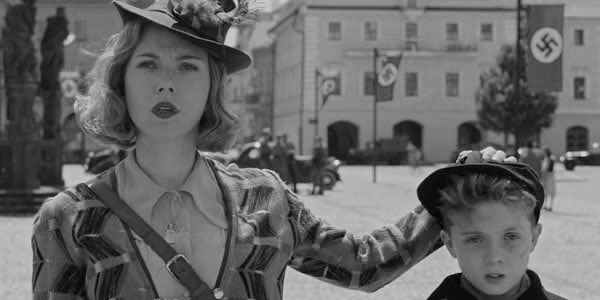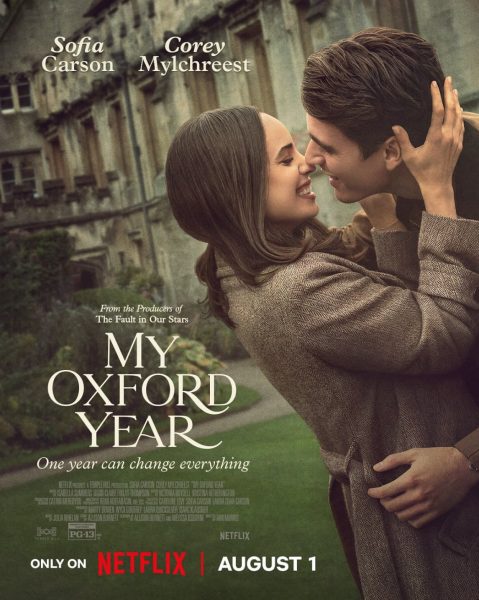“Jojo Rabbit” Mocks Nazism With Youthful Glee

“Jojo Rabbit” sucessfuly spoofs Nazism without denying the movements evil nature. (Courtesy of Twitter)
In light of recent political events, it’s hard to believe that even “Thor: Ragnarok” director Taika Waititi could make a Hitler Youth–focused satire watchable. Thankfully, “Jojo Rabbit” not only succeeds as an indictment of fascism and antisemitism but also as a coming-of-age dark comedy.
Ten-year-old Johannes “Jojo” Betzler (Roman Griffin Davis) keeps his dreams of joining Hitler’s personal guard, dashed by a grenade training exercise gone wrong.
The isolated, fanatical child’s only real comfort is his imaginary friend, an absurd caricature of Hitler (Taika Waititi). The boy’s hateful worldview is challenged when he discovers that his mother Rosie (Scarlett Johanson) has been sheltering Elsa (Thomasin McKenzie), an orphaned Jewish teenager.
It’s easy to imagine “Jojo Rabbit” making a mockery of one of the most horrific periods of human history, but the film largely avoids that issue by using its absurd sense of humor to criticize fascism. Bizarre gags and exaggerated characters convey that Nazism requires people to detach themselves from not only reality, but also their own humanity.
The film’s satire is reinforced by the best scenes being ones that break from comedy. A real sense of loss and horror builds throughout the film. Even the ending’s life-affirming message can’t counter it.
“Jojo Rabbit” takes its fair share of historical liberties but never at the expense of the tragic reality it draws from. The almost Wes Andersen–like depiction of Berlin and its bumbling inhabitants is paired with an unflinching look at fascism’s murderous consequences.
“Jojo Rabbit” doesn’t make light of World War II, so much as point to the absurdity of the rituals and beliefs that sustain Nazism. Despite this, Jojo repeating Nazi ideology is deeply uncomfortable to watch, even if it’s meant to be this way.
His entire character arc consists of overcoming his own indoctrination, which, in turn, informs the viewer of fascism’s insidious nature.
The consistently stellar performances of the cast lends “Jojo Rabbit” a strong sense of soul. Roman Griffin Davis manages to keep up with the narrative’s constantly shifting emotions. He brings a real humanity to Jojo, making you root for the boy he could be, rather than the person he is. This conflict is discussed by several characters, but Davis’ performance is what realizes it.
Waititi’s rendition of an imaginary Hitler is reminiscent of similar interpretations in films like “The Great Dictator” and “The Producers.” However, the farcical aspects quickly transition into something much darker. This reinforces the film’s core themes, showing that even a child’s imagination can’t temper pure evil.
Although the rest of the actors don’t quite match the lead performances, their contributions are just as valuable, especially when it comes to the more human aspects of the story. Nowhere is this better represented than in McKenzie’s role as Elsa. The maturity and nuance she brings to her character goes a long way in preventing the film from becoming a distasteful romp in Nazi Germany. Elsa’s encounters with Jojo engage with a wider range of emotion than most other films manage to cover at all. “Jojo Rabbit” hinges around every actor’s in-depth performance, but few of the characters leave as much of an impact as Elsa.
“Jojo Rabbit” is the sort of once-in-a-generation film that succeeds both in spite, and because, of its central premise. Conceptually, it’s repugnant, but the concerted effort of talented artists make it more than acceptable. This film sounds like the last thing that needs to be in theaters at a time when far-right populism is on the rise, but “Jojo Rabbit” offers the insightful, character-driven social commentary we need right now.
On top of all that, it’s one of the rare films that will make you laugh just as much as it will make you cry.












































































































































































































